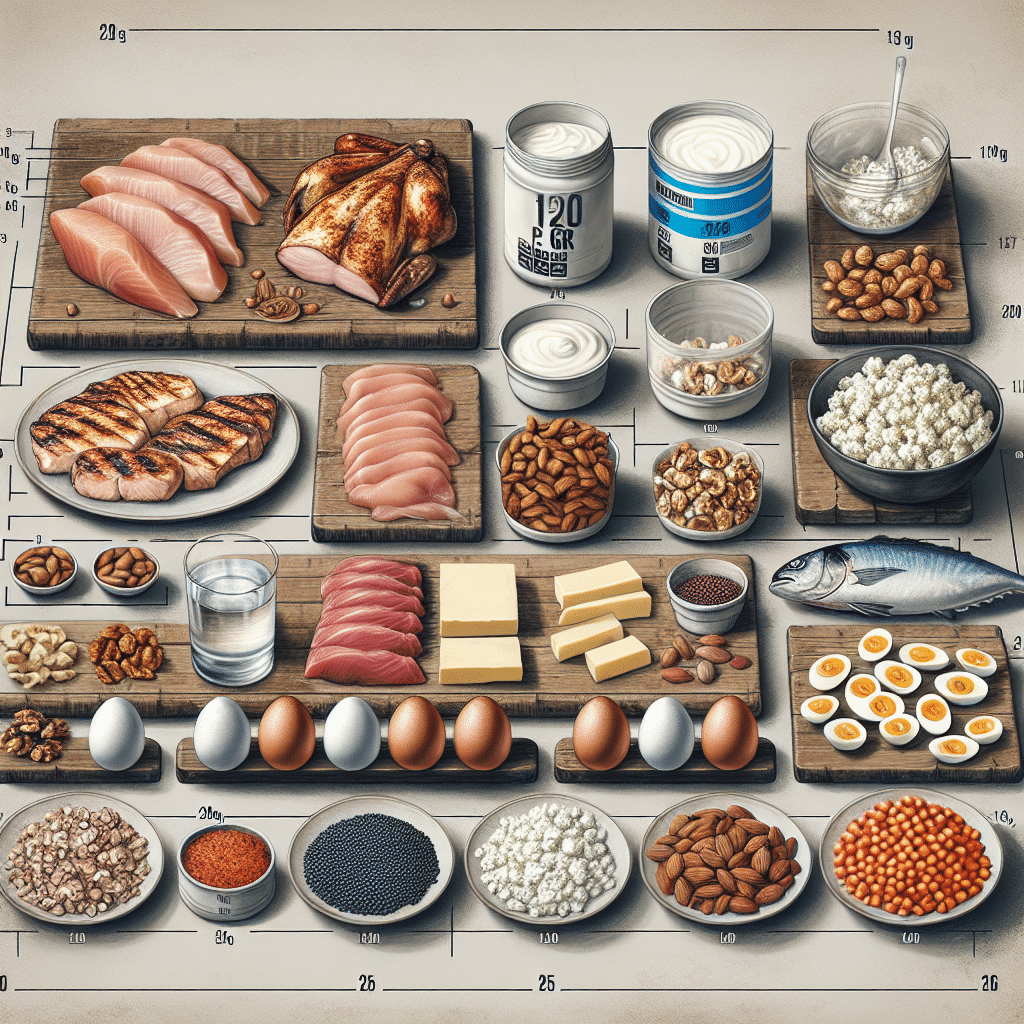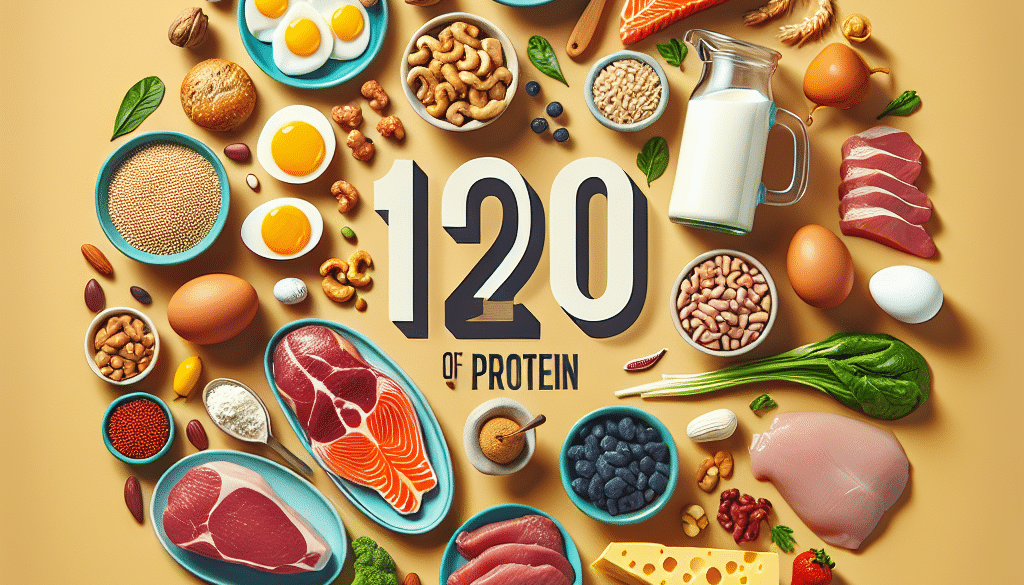Visualizing 120 Grams of Protein: What It Looks Like
-
Table of Contents
- Visualizing 120 Grams of Protein: A Comprehensive Guide
- Understanding Protein Requirements
- Animal-Based Protein Sources
- Plant-Based Protein Sources
- Protein in Supplements and Powders
- Visualizing Your Daily Protein Intake
- Considerations for High-Protein Diets
- Conclusion: Key Takeaways
- Discover ETprotein’s High-Quality Protein Products
Visualizing 120 Grams of Protein: A Comprehensive Guide

Protein is a vital macronutrient that plays a crucial role in building and repairing tissues, making enzymes and hormones, and supporting overall health. For athletes, bodybuilders, or those looking to increase muscle mass or lose weight, consuming adequate amounts of protein is essential. But what does 120 grams of protein actually look like on your plate? This article will provide a visual and practical guide to understanding and visualizing what 120 grams of protein looks like in various food sources.
Understanding Protein Requirements
Before diving into what 120 grams of protein looks like, it’s important to understand why someone might aim for this amount. The Recommended Dietary Allowance (RDA) for protein is 0.8 grams per kilogram of body weight for the average adult. However, individuals with higher activity levels or specific fitness goals may require more. For example, athletes or those engaging in heavy resistance training might aim for 1.2 to 2.0 grams per kilogram of body weight.
Animal-Based Protein Sources
Animal-based foods are considered complete proteins because they contain all nine essential amino acids. Here’s what 120 grams of protein from different animal sources might look like:
- Chicken Breast: Approximately 500 grams (17.6 ounces) of cooked chicken breast would provide around 120 grams of protein.
- Lean Beef: About 480 grams (16.9 ounces) of cooked lean beef would equal 120 grams of protein.
- Fish: For example, 600 grams (21.2 ounces) of cooked salmon would offer roughly 120 grams of protein.
- Eggs: You would need to consume around 20 large eggs to reach 120 grams of protein.
- Greek Yogurt: Approximately 1,200 grams (42.3 ounces) of non-fat Greek yogurt would provide 120 grams of protein.
Plant-Based Protein Sources
Plant-based proteins can also help you reach your protein goals. Here’s how you can visualize 120 grams of protein from various plant sources:
- Tofu: Around 1,500 grams (52.9 ounces) of firm tofu would contain 120 grams of protein.
- Lentils: To get 120 grams of protein from lentils, you’d need to consume about 1,000 grams (35.3 ounces) of cooked lentils.
- Black Beans: Approximately 1,090 grams (38.4 ounces) of cooked black beans would provide 120 grams of protein.
- Quinoa: Around 1,200 grams (42.3 ounces) of cooked quinoa would equal 120 grams of protein.
- Nuts and Seeds: A combination of nuts and seeds throughout the day can add up to 120 grams of protein, but this would also be high in calories and fats.
Protein in Supplements and Powders
Protein supplements and powders are a convenient way to increase your intake. Here’s what 120 grams of protein from supplements might look like:
- Whey Protein: Roughly four scoops of whey protein powder, depending on the brand and concentration.
- Casein Protein: Similar to whey, about four scoops of casein protein powder would provide 120 grams of protein.
- Plant-Based Protein Powders: Plant-based protein powders such as pea or rice protein would also require around four scoops.
Visualizing Your Daily Protein Intake
To visualize how you might distribute 120 grams of protein throughout the day, consider the following meal plan:
- Breakfast: Greek yogurt with nuts and seeds (30 grams of protein)
- Snack: Protein shake with one scoop of protein powder (30 grams of protein)
- Lunch: Chicken breast salad (30 grams of protein)
- Snack: Hard-boiled eggs or a serving of tofu (15 grams of protein)
- Dinner: Grilled salmon or lentil stew (30 grams of protein)
Considerations for High-Protein Diets
While a high-protein diet can be beneficial for muscle growth and weight management, it’s important to consider the potential health implications. Consuming too much protein, especially from animal sources, may be associated with health risks such as kidney damage and increased heart disease risk. Balance is key, and it’s crucial to include a variety of protein sources in your diet.
Conclusion: Key Takeaways
Visualizing 120 grams of protein can help you better plan your meals and ensure you’re meeting your dietary goals. Whether you choose animal or plant-based sources, or a combination of both, understanding portion sizes and the protein content of foods is essential. Remember to consider your individual needs and consult with a healthcare professional or a registered dietitian when making significant changes to your diet.
Discover ETprotein’s High-Quality Protein Products
If you’re looking to supplement your protein intake, ETprotein offers a range of plant-based protein products that can help you reach your nutritional goals. Their organic and non-GMO protein powders are perfect for shakes, smoothies, and cooking, providing a convenient and healthy way to boost your protein consumption.
About ETprotein:
ETprotein, a reputable plant protein vegan protein Chinese factory manufacturer and supplier, is renowned for producing, stocking, exporting, and delivering the highest quality organic bulk vegan protein and plant proteins. They include Organic rice protein, clear rice protein, pea protein, clear pea protein, watermelon seed protein, pumpkin seed protein, sunflower seed protein, mung bean protein, peanut protein etc. Their offerings, characterized by a neutral taste, non-GMO, allergen-free attributes, cater to a diverse range of industries. They serve nutraceutical, pharmaceutical, cosmeceutical, veterinary, as well as food and beverage finished product distributors, traders, and manufacturers across Europe, USA, Canada, Australia, Thailand, Japan, Korea, Brazil, and Chile, among others.
ETprotein specialization includes exporting and delivering tailor-made protein powder and finished nutritional supplements. Their extensive product range covers sectors like Food and Beverage, Sports Nutrition, Weight Management, Dietary Supplements, Health and Wellness Products, and Infant Formula, ensuring comprehensive solutions to meet all your protein needs.
As a trusted company by leading global food and beverage brands and Fortune 500 companies, ETprotein reinforces China’s reputation in the global arena. For more information or to sample their products, please contact them and email sales(at)ETprotein.com today.














